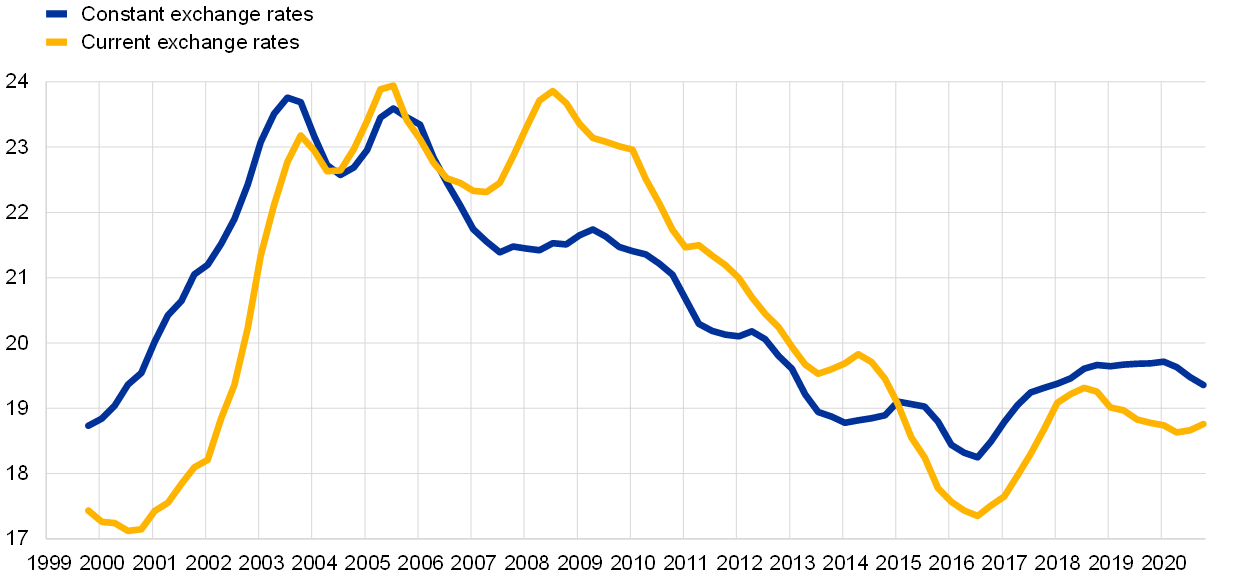- PRESS RELEASE
International use of the euro broadly stable in 2020
2 June 2021
- Euro remains unchallenged as second most widely used currency globally after the US dollar
- International role of the euro is broadly stable after the pandemic shock
- Euro plays large role in international green bond markets
The international role of the euro remained broadly stable in 2020. This was one of the main findings in the latest annual review of the international role of the euro, published today by the European Central Bank (ECB). “The euro remains unchallenged as the second most widely used currency globally after the US dollar”, said ECB President Christine Lagarde.
The share of the euro across various indicators of international currency was stable, averaging around 19% in 2020.
More specifically, the euro’s share in outstanding international loans, in the stock of international debt securities and as an invoicing currency for extra-euro area imports of goods remained broadly stable. The share of the euro in global foreign exchange reserves declined, as did the share of the euro in foreign currency-denominated debt issuance and in outstanding international deposits.
The euro remained a key currency in international green bond markets, a small but rapidly growing segment of international debt security markets. Over half of the green bonds issued globally in 2020 were in euro. For international issuance (i.e. bond issues by non-nationals), about one-third of green bonds issued in 2020 were denominated in euro, which represented a threefold increase compared with 2016.
The relative resilience of the international role of the euro despite the pandemic shock stands in contrast to the significant decline observed in the wake of the euro area sovereign debt crisis. “To some extent, this development may reflect the effectiveness of the unprecedented policy support measures and coordinated approach that have prevailed in the euro area during the COVID-19 crisis,” said ECB President Lagarde.
Looking ahead, the international role of the euro will be primarily supported by a deeper and more complete Economic and Monetary Union, including advancing the capital markets union, in the context of the pursuit of sound economic policies in the euro area. The Eurosystem supports these policies and emphasises the need for further efforts to complete Economic and Monetary Union.
The report also contains three special features. One of them examines how the issuance of a central bank digital currency could impact the international role of currencies. “Depending on its design, a central bank digital currency may support the use of a currency in cross-border payments. However, fundamental forces, such as the quality of economic policies and institutions, as well as the depth of markets, remain the most important factors for international currency status,” said Fabio Panetta, member of the ECB’s Executive Board. Another special feature considers the implications for the international role of the euro of the European Union and ECB policy responses to the pandemic. The third special feature presents a new dataset that offers a comprehensive and up-to-date understanding of how major currencies are used in global trade invoicing.
Chart 1
Composite index of the international role of the euro
(percentages; at current and Q4 2020 exchange rates; four-quarter moving averages)

For media queries, please contact Peter Ehrlich, tel.: +49 69 1344 8320.
Europejski Bank Centralny
Dyrekcja Generalna ds. Komunikacji
- Sonnemannstrasse 20
- 60314 Frankfurt am Main, Niemcy
- +49 69 1344 7455
- media@ecb.europa.eu
Przedruk dozwolony pod warunkiem podania źródła.
Kontakt z mediami

